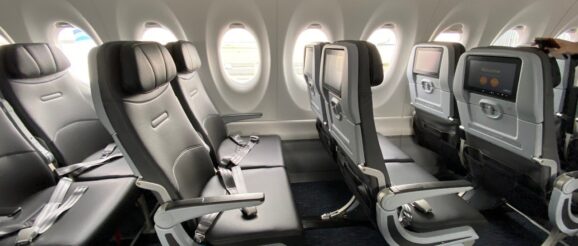JetBlue A220 sees softer seat feel thanks to Ultrafabrics, Tapis innovation

This story is produced in partnership with PaxEx.Aero – The Business of Passenger Experience
It is unlikely that you’ll snag a ride on Virgin Galactic’s SpaceShipTwo or the McLaren Elva any time soon, but sitting down on board a new JetBlue A220 could offer one significant similarity: The new planes feature an Ultraleather seat covering of the same lineage as those much more rare experiences. JetBlue is not the only airline flying the Promessa AV fabric on board. But the “synthetic vegan leather” is new to the carrier’s A220s and part of a cabin designed from top to bottom for a more comfortable passenger experience.
The material, produced by Ultrafabrics and finished for the aerospace market by Tapis Corporation, offers a mix of comfort, softness, flexibility, and safety unmatched in the market.
Comfort and consistency on board
JetBlue Director of Product Development Mariya Stoyanova notes that the company focused on “a different material for the seat covers to make them even more comfortable.” She continues, “The Ultraleather gives in a little more than the other leathers we’ve had so it enhances the comfort of the seat even more. It feels softer.” That softer feel and the increased give could raise alarms in the maintenance department, however, with the material sagging over time, creating “puddles” in the seat as the cushion compresses. The Ultraleather Promessa AV avoids that problem through a unique base layer structure.
It is engineered as a twill weave, what Tapis Sales Director Matthew Nicholls describes as a “lockstitch in inverted commas that prevents the material from over-stretching.” The result is “super comfort from the foam layer which is just above it, but without sagging and bunching six months down the line.” Ultimately the synthetic material nature of the product delivers consistency in production and feel, a critical advantage for the Ultraleather Promessa AV line. But the fabric is more than just the surface visible to passengers. It is a multi-layered assembly engineered to JetBlue’s specifications to ensure comfort for passengers not just when the planes are new, but for the entire lifecycle of the seats.
Cleanliness and safety built in from the factory
Another key benefit of the Ultraleather Promessa line is the antimicrobial nature of the fabric. Including this in the material was a design choice made well before the current pandemic, one that, According to Nicholls, was almost skipped over because no airline customers were asking about it. But the company kept it as part of the specification and is benefitting from that decision today. Even more significant is how Ultrafabrics gets the antimicrobial treatment into the fabric. Director of Branding Nicole Meier explains, “A lot of competitive products put the treatment on as a top coat after the core fabric is manufactured. For Ultraleather it is inherent in the multi-layer construction. That adds to the longevity.” Because it is embedded in the material rather than added as a top coat or treatment after the fact the antimicrobial nature of the product will last as long as the fabric does. It does not wash off or erode with the aggressive cleaning regimens seats undergo today. Nicholls does not expect the cleaning requirements to scale back, even as the pandemic subsides, “it is inevitable that something else will come, so cleanable and disinfectable surfaces will become the new normal.” Even if airlines scale back on their approach passengers are bringing their own wipes on board, and the seats must withstand it all. Some airlines are already seeing the impact of repeated cleanings, with materials delaminating or otherwise wearing out faster than expected. The polycarbonate base of Ultraleather, however, stands up to that treatment better than the rest. The companies have tested myriad solvents and other cleaning approaches such as UV-C thanks to their history outfitting medical and dental office equipment, as well as their global airline install base. Tapis and Ultrafabrics are confident the fabrics can comfortably survive anything society – even in this new normal – can throw at it. And still keep killing the microbes for years to come.
